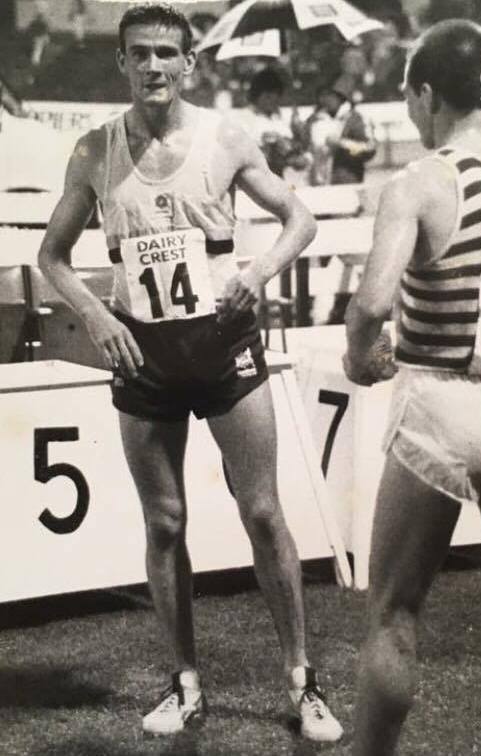Steve Jones is one of the legends of the running world, breaking the world record in his debut marathon (2:08:05) without changing his diet of Mars Bars, meat pies, and Coca Cola! He went on to win the Toronto, New York, and London marathons, including taking a bathroom break at the 23 mile mark of the London marathon, and still winning. He shares that story in full for the first time today, and we discuss how he didn’t let stomach issues derail his plan to be the best.
Steve was given the nickname “The King of Pain” for his ability to push harder in running than anyone else, and his coach said he had an insatiable appetite for hard work. Steve never missed an opportunity, taking every chance to race he could, and he explains why he thinks all of us should race more, especially if it means we can explore a new city or place.
We compare training and racing to baking a cake, and Steve explains why just one missing ingredient or step could lead to disaster in a race, but at the end of the day, we have to look inside ourselves to see why we were not ready.
Steve is honest, real, and doesn’t hold anything back. This episode is for you if you love to hear about running without complications, at a time when running meant just getting out there and being the best you could be. Steve is real with us, sharing the ups, and especially the downs that took him from running around mountains for run with his friends, to being the best in the world.
Today’s Guest
Steve Jones
Former World Record holder in the marathon, finished 8th in the Olympics, and known for being able to handle a punishing pace from the start of any race better than anyone else.
What You Will Learn About
- Steve’s upbringing and how a lack of structure in his running and racing allowed him to just have fun and enjoy every opportunity
- Why he was given the nickname “The Fox”
- How to cope with the stressors and situations that come up in races
- Why runners get in trouble in races and feel like they are mentally giving up (and what is actually going on)
- Why his training is 100% effort based, and why every runner should consider switching to this type of training
- How he has changed his philosophy now that he is coaching other runners, and how he realized “not everyone is Steve Jones”
Listen to the Running for Real Podcast
[podcast src=”https://html5-player.libsyn.com/embed/episode/id/5544480/height-orig/90/theme/custom/thumbnail/yes/direction/forward/height/90″ height=”90″ width=”100%” placement=”bottom” theme=”custom”]Apple (iTunes) Podcast|Sticher| Castbox| Overcast | Spotify| Google Play| iHeartradio|
Steve’s #R4RPowerPose

Inspirational Quotes
Exercise was a way of release, I suppose. Today it is all mental with games and technology, but our release was going out and running in the mountains.
It wasn’t technology, it wasn’t science, it was just running every day.
When you are running well, especially in that sort of situation, where it’s head to head with yourself and the next best guy, trying to win, those things really don’t bother you very much.
I spotted a headline just yesterday about how to manage your threshold run. I run threshold all the time, so I learned that very quickly. Now it is a specific workout, but I did it every day. I trained hard, and when I raced, wherever it was, UK, the US, Europe, when the gun went, I always went off hard…I always gave it 100%.
Everything was progressive. We didn’t just jump in at the deep end straight away. Going from 60 miles a week to 65 to 70 miles a week, those incremental increases and small increases year in year out, helped me develop that strength.
It wasn’t about trying to win the races, it wasn’t about being a superstar, I just wanted to beat that SOB in front of me. It was one step at a time. I never had dreams, I never dreamt I was going to break a world record, I never dreamt I would run 27:39 for 10k, I just kept trying and trying, and I was never disappointed.
You have to take the rough with the smooth and most times in sport, there is a lot more rough than there is smooth.
Racing and running gets to be more than a hobby. Although in the 70s, 80s, and 90s, it was just a hobby, you don’t learn anything by just going out and training every day.
Because my training was effort based, I didn’t need to know how fast I was going, how far I was going, I just needed to know when to start and when to stop.
You are racing other people, not your watch. You are racing the distance, not your watch. You are racing the 5k, 10k, 1/2 marathon, 10 miler and the 13,000 other people racing side by side with you. You are racing those people.
People are more OCD about going for a run than they are about trying to improve their running.
I am the quintessential club runner that became good. I came from nothing. No talent, no running equipment, a pair of Woolworths plimsolls, to being the best in the world.
Resources Mentioned
- Last week’s episode with my husband Steve
- Tina’s effort based Marathon Training Plan
- Tina’s effort based Half Marathon Training Plan
- Steve’s facebook
- Steve’s twitter
Thanks to Generation UCAN for sponsoring this podcast, you can get 15% off your order by visiting this link and using code RUNNING4REAL.
 Thanks for listening! I hope you enjoyed today’s episode.
Thanks for listening! I hope you enjoyed today’s episode.
To share your thoughts:
- Leave a note in the comment section below.
- Join the Running for Real Facebook Group and share your thoughts on the episode (or future guests you would like to hear from)
- Share this show on Twitter, Facebook, Instagram, or Pinterest.
To help out the show:
- Leave an honest review on iTunes. Your ratings and reviews will really help me climb up the iTunes rankings and I promise, I read every single one.
- Subscribe on iTunes or your favorite podcast player.
Not sure how to leave a review or subscribe, you can find out here.
Thank you to Steve. I look forward to hearing your thoughts on the show.



